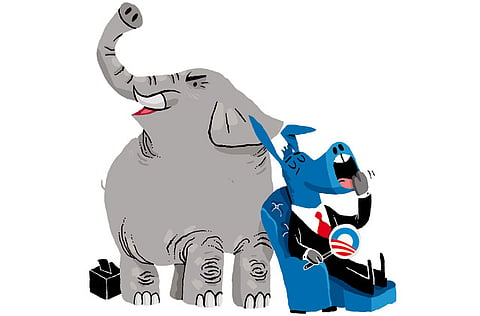Republicans hold upper hand, but not by much
Though Obama's ratings have fallen, he is still the most popular politician in the US

Six weeks shy of election day America's political landscape remains unsettled. Usually, by this stage, a narrative has taken hold, one that comes to define the final stage of the campaign. This year, however, that does not appear to be the case.
That may sound like an odd assertion at a moment when America's dominant political narrative — voter anger, Republican resurgence, Democratic despair — seems to have been locked in months ago.
The ‘anger-resurgence-despair' theory, however, ignores a reality that political pros (by which I mean not only politicians and party operatives but also the media) often miss: the vast majority of people pay only passing attention to politics.
That is why narratives are important in the first place. They establish the frames through which the majority of voters view any given election.
This is important because of another thing the professionals often forget: there are many, many people who always vote, and who take voting seriously, but who have little day-to-day interest in politics.
Beyond the act of voting these people do not get involved: they don't knock on doors. They do not donate money to candidates. They don't put signs on their lawns or buttonhole their friends. Most importantly, they have no interest at all in political combat. Politics as 24/7 bloodsport (i.e. the way the pros see it) they regard as both dull and revolting.
It is because of people like these that the framing of a campaign is so important. These folks will not be paying attention for long and here, as in other walks of life, first impressions are often lasting impressions.
So what first impressions are voters arriving late at this year's political party likely to have? Unsurprisingly, the key figure in all of this is likely to be Barack Obama himself.
First, there is the fact that Obama's presidency has largely lacked the passion that was such a defining element of his 2008 campaign. Since inauguration day the president has often appeared to be more studious technocrat than transformative leader. Until recently, he had mostly tried to avoid making openly partisan public statements.
Democrats look at this and wonder where the guy they voted for went. Republicans find validation for their long-held view that Obama is little more than a shallow poseur.
Still, many recent opinion polls show dissatisfaction with the president — but only up to a point. His numbers, while far below those he enjoyed at the start of his term, are not especially low for a new president facing his first midterm election. Obama's popularity may have waned, but he is still the most popular politician in the country.
Mixed signals
A much-cited poll that came out last week tells a seemingly contradictory story: the public has an even lower opinion of congressional Republicans than it does of Democrats, but when asked in broad terms which party they plan to vote for, the GOP holds a significant lead. How many Republican victories this will translate into is the big question of the autumn.
A lot may turn on how the high-profile newcomers nominated by the GOP for governorships and senate seats across the country fare. Many of these candidates are supported by the ill-formed coalition of anti-Obama activists known as the "Tea Party" and several have come to prominence sporting decidedly unconventional resumes. Most, since winning the Republican party's nomination, have been trying to move towards the political centre while telegraphing to their political base that they are still reliable.
By the time the mass of relatively non-political Americans begin paying attention, will these candidates have successfully repositioned themselves (or, if one is feeling less charitable about these things: buried their pasts)? Or will the Democrats succeed in making these GOP'ers look like they are dangerously outside the American mainstream? The next few weeks will tell.
Republicans firmly believe that Americans have had it with the president. Though Obama is not on any ballot this November, the GOP is building its campaigns around him — urging voters to demonstrate their rejection of the president by voting out Democrats.
Democrats believe their best hope lies in seeing Obama recapture the vision and energy that swept him to office two years ago.
The bottom line: America's 2010 political landscape still looks better for Republicans than it does for Democrats, but the details of that picture are much fuzzier than many experts would have you believe.
Gordon Robison is a writer and commentator who has covered the Middle East for print, radio and television since the 1980s, including assignments for ABC News, CNN and Fox. He has also taught Islamic History at Emerson College and Middle East Politics at the University of Vermont.



